Black Christmas (2019)
Directed by: Sophia Takal
Written by: April Wolfe, Sophia Takal
Starring: Aleyse Shannon, Cary Elwes, Imogen Poots, Lily Donoghue
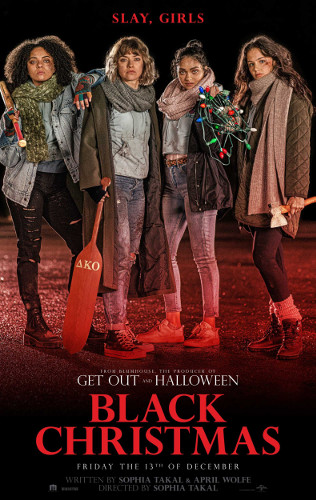
BLACK CHRISTMAS
Directed by Sophia Takal
This review contains spoilers.
I’m dreaming of a Black Christmas, just like the one I used to know. Nowadays, the 1974 original is maybe better viewed as a historical curiosity than a great film. Its humour fails to land more often than not, and the pacing is off. Yet it gifted horror fans with the classic slasher template. Moreover, decades later, it still has a lot going for it: those creepy calls, the rich characterisation and a brilliantly tense atmosphere. None of which Glen Morgan’s eye-fetishist friendly 2006 version Black Xmas had. Now in its third incarnation, the latest telling by director/ co-writer Sophia Takal shows that more is not always merrier.
Tis the season at Hawthorne College: a higher education institute straight out of Republican nightmares. There are protests aplenty, the bust of its slave-owning founder was taken down following demonstrations, and white, stale, male Professor Gelson (Elwes) is getting petitioned for not diversifying the reading list. Not everyone is so outspoken, though. The withdrawn Riley (Poots) struggles to navigate the complex world of modern social justice. In addition to dealing with the trauma of being raped by a hyper-masculine, super-entitled jock – from the almost cartoonishly toxic frat boys’ house. Meanwhile, at least one masked killer seems to be stalking the grounds and using direct messages to scare the heck out of the sorority girls women. But are all these things related?
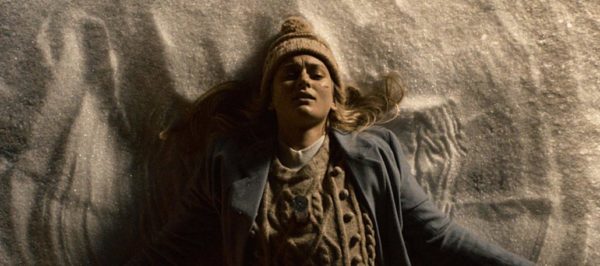
Thus far, the movie’s proven controversial among some horror fans – many who have dismissed it for being too feminist. Which implies to me that they never paid much attention to the first, given its story was all about female empowerment and agency. Even by today’s standards, the way Black Christmas handles abortion is fairly radical. As such, it makes sense Takal has chosen to update it for the #MeToo era. I also think there’s potential for a self-aware slasher that moves representations beyond the dichotomy of pure final girl vs the combo of T and A meets blood and guts. Scenes like a lone woman walking home at night, hearing footsteps behind her and then making a fist around her key have a powerful familiarity. Likewise, a scene where the campus security guard dismisses Riley’s concerns with “boys will be boys”. It’s interesting that in the 1974 version the authorities were not checking the attic level inept, whereas now they’re negligent. Much of the dialogue is very topical too, with references to campus rapes and intersectionality plus phrases like “the white supremacist patriarchy” cropping up every so often. Professor Gelson’s musings also have a passing resemblance to the ravings of a certain popular psychologist who’d likely sue if I name him here.
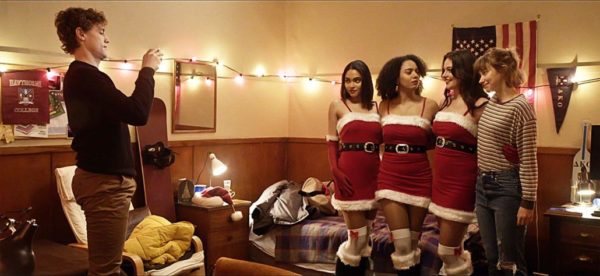
The problem is that more often than not Black Christmas seems to equate paying lip service to its themes with exploring them. Hence, at times, the less than subtle script sounds like a box-ticking exercise that does little to interrogate what its terminology means. There’s also a clunky whodunit that’s about as predictable as your Chocolate Orange stocking-filler and reveals a motivation that’s utterly crackers. To be fair, the movie attempts to work it’s at times overwhelming wokeness into the plot. It’s not a million miles away from Get Out, which had a similar structure of a villain hiding in plain sight and then a turn towards the supernatural. Only here the commentary is broader and, despite the best attempts of an able cast, the characterisation is poor, with the leads having mostly interchangeable parts. It’s also a lot clumsier, with a tone which neither commits to its increasing ludicrousness nor handles its more serious elements with the tact they both need and deserve. Unlike either Jordan Peele outing, this struggles to find the line between sincerity and knowing satire. The vague point it is trying to make is also completely undermined by a baffling eleventh-hour explanation that reduces the agency of its threat. Excusing their behaviour in a way that makes the film’s real-world implications deeply problematic.

Most importantly, though, Black Christmas doesn’t function well as a horror film. After the pre-credits kill, the scare scenes are all too telegraphed and familiar, with unimaginative seasonal kills involving icicles and Christmas lights. All of them are bloodless, with too little visceral impact to compensate for this. One is outright stolen from a better film too. And while you’d think dimly lit dorms and old buildings would make for an excellent location, aside from one fairly short scene of stalk and slash they feel wasted. Especially after the preposterous second half ditches all pretence of being a Black Christmas film, building to the tonally misjudged, and outlandish supernatural twist it never manages to sell. It becomes a campy, near-parody of modern feminist discourse with a what little tension Takal creates being lost when it descends into a scrappy battle of the sexes that culminates without even a coda. I appreciate this is more detail than I would normally go into, but without commenting on the destination it is tough to explain how unsatisfying the journey seems in retrospect.
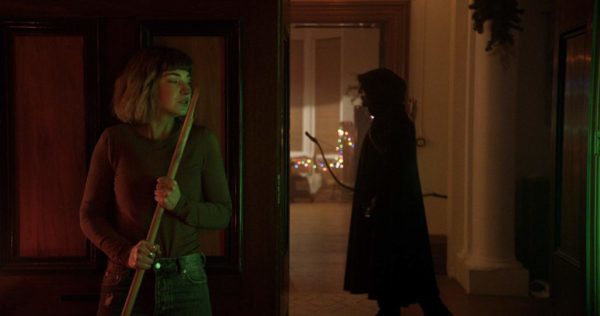
And on that, 2019 fizzles out for genre giants Blumhouse. With their line-up including the so-so flicks Happy Death Day 2U, Don’t Let Go, Ma, Glass and The Gallows Act II, they’ve not had a great year. Who knows, perhaps The Hunt may have changed this if it were released. But since it wasn’t, it’s been otherwise unremarkable, and a step down from their recent form. And though I’m undecided on it vs Glass, they may have saved the worst for last. Heck, even sticking to remakes I yearn for a Black Christmas like the one I used to know: at times this makes the 2006 one look like the original. Netflix’s dismal thriller Secret Obsession may have some competition on my end of year naughty list.
Black Christmas is out now.
Rating: 






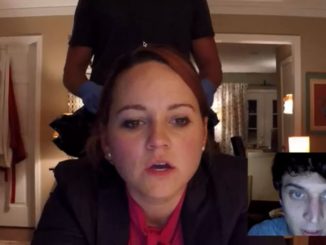
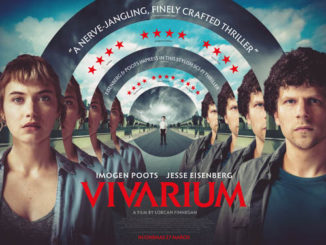
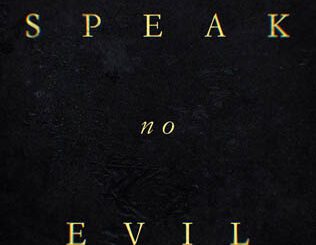
Be the first to comment